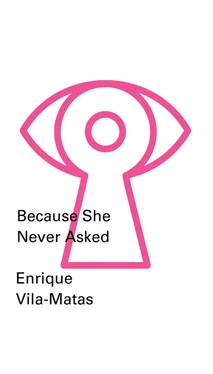Enrique Vila-Matas - Because She Never Asked
Здесь есть возможность читать онлайн «Enrique Vila-Matas - Because She Never Asked» весь текст электронной книги совершенно бесплатно (целиком полную версию без сокращений). В некоторых случаях можно слушать аудио, скачать через торрент в формате fb2 и присутствует краткое содержание. Год выпуска: 2015, Издательство: New Directions Publishing, Жанр: Современная проза, на английском языке. Описание произведения, (предисловие) а так же отзывы посетителей доступны на портале библиотеки ЛибКат.
- Название:Because She Never Asked
- Автор:
- Издательство:New Directions Publishing
- Жанр:
- Год:2015
- ISBN:нет данных
- Рейтинг книги:4 / 5. Голосов: 1
-
Избранное:Добавить в избранное
- Отзывы:
-
Ваша оценка:
- 80
- 1
- 2
- 3
- 4
- 5
Because She Never Asked: краткое содержание, описание и аннотация
Предлагаем к чтению аннотацию, описание, краткое содержание или предисловие (зависит от того, что написал сам автор книги «Because She Never Asked»). Если вы не нашли необходимую информацию о книге — напишите в комментариях, мы постараемся отыскать её.
Stranger on a Train
“Something strange happened along the way,” Vila-Matas wrote. “Normally, writers try to pass a work of fiction off as being real. But in
, the opposite occurred: in order to give meaning to the story of my life, I found that I needed to present it as fiction.”
Because She Never Asked — читать онлайн бесплатно полную книгу (весь текст) целиком
Ниже представлен текст книги, разбитый по страницам. Система сохранения места последней прочитанной страницы, позволяет с удобством читать онлайн бесплатно книгу «Because She Never Asked», без необходимости каждый раз заново искать на чём Вы остановились. Поставьте закладку, и сможете в любой момент перейти на страницу, на которой закончили чтение.
Интервал:
Закладка:
.
3
Still at home that evening, I decide to read the remaining entries in my red notebook all in one sitting and confirm my suspicion that until that December day when I registered Sophie Calle’s call to my home in Barcelona, there was nothing of relevance in the trivial events of my life. Up to then, there was nothing significant in the notes, which are strictly rough drafts. Nothing worth correcting. In fact, it would be best to leave them as they were recorded, as what they are: the grey contours of my own life.
It’s often said that literature carries a considerable advantage over life: one can go back and correct it. But in my case, I’m not interested in going back or correcting anything; I think it’s better to leave it all be, at least till the day in question, when I recorded how Sophie Calle called me at home. The game changed after that. It marked a before and after in my diary, because that’s when I started making the story up. Until then, my notes communicated things that really happened to me. But something changed that day, and I came up with the idea of pretending that Sophie Calle had called me at home to propose a mysterious project that she couldn’t talk about over the phone. After a while, I began elaborating literarily on this quickly jotted, imaginary note, transferring it to the computer and creating a parallel fiction to what I continued crafting in my spirited red notebook of quick notes.
Why did I pretend that Sophie Calle telephoned me at home? And why did I make believe that she had asked me to write something for her to bring to life? Perhaps I made it all up precisely because she didn’t ask .
Sophie Calle never telephoned me at home; that part belongs to my imagination. The same goes for the story of our agreements and disagreements, all make-believe. I guess I concocted the phone call and everything else because I was fed up with my own lethargic existence and needed to describe a more interesting life in my diary.
Now that I think about it, I have a make-believe story with Sophie and it’s all written down. From now on, I can challenge myself to live it out instead of just imagining it. But how can I bring it to life? First of all, how can I get Sophie Calle, whom I don’t know, to call me at home? It would be even more difficult to get her to meet me at Café de Flore to ask me for all these things: like proposing what she had already proposed to Paul Auster eight years ago. It’s a tricky story to bring successfully to life, but nothing’s impossible, and I don’t want to feel defeated even before I get started. I’ll take the necessary steps toward bringing the story with Sophie Calle to life, which I’ve been contriving and writing down. In other words, if Don Quixote is about a dreamer who dares to become his own dream, my story would be that of the writer who dares to bring what he has written to life, specifically, in this case, what he’s invented about his relationship with Sophie Calle, his favorite “narrative artist.”
.
4
Actually, it wouldn’t be all that difficult to get Sophie to call me at home. All I need to do is talk to Ray Loriga. He was responsible for describing to me everything that Sophie had been going through over the past few months. It was he who told me about the slow agony of her mother and the funeral in Montparnasse, the details of the Venica Biennale and her friendship with Florence Aubenas. Ray explained so many particulars about Sophie, that I was able to contrive this little comedy of errors with her. Ray also told me about how, three years ago, Sophie had asked him to write a story that would allow her to bring literature to life. As Ray soon found out, she had proposed the same thing to Paul Auster, Jean Echenoz, Olivier Rolin, and very likely to other writers, too.
In fact, my make-believe relationship with Sophie began precisely on the day when Ray, a friend of hers for many years, detailed the story of Sophie’s invitation for him to write her a story that she would bring to life. Ray said that everything came to a dead end, the same as what happened with Auster, Echenoz, and Rolin. I remember instantly feeling jealous when I learned about it, I would have loved for Sophie Calle to propose or ask me for something like that, especially considering all the years I’ve spent speculating on the relationship between life and literature, rummaging around for a technique to go beyond them, especially beyond literature.
After that, finding a way to get close to Sophie Calle became the only thing that would fetch a little joy into my life. Why shouldn’t I take a stab at getting my favorite “narrative artist” to suggest bringing something that I had written to life? It seemed to me that I had as much right as anyone else to hear the proposal. Didn’t I? Not only was Sophie’s proposition as dangerous as it was appealing, it opened the door to a fascinating, outlandish test to push everything a step further; to go, once and for all, beyond writing itself. In fact, from a certain perspective, the challenge turned writing into a mere rag, reduced it to the condition of being a little crumb, a measly mundane procedure to gain access to life: life, which is so important. Isn’t it? Isn’t that what we always say? Suddenly, I felt overcome with doubt. Life, so primordial. I repeated it to myself: Life, so primordial. So essential, I added. The blood and the liver, so crucial. My doubts increased. Should life be given a place of such preference? Since the very get-go, say since Cervantes, I told myself, this tension between literature and life is what the novel has been developing all along. Truly, what we call the “novel” is nothing more than this ongoing conversation.
A few days later, I recall, I considered similar subjects on Carta Libre , Ray Loriga’s program for Spanish television, on which I discussed my Sophie Calle story, the supposedly professional relationship I had been developing with her, as if it were true, never once letting on that it was all make- believe. Ray, who loves pretending, played along with the mischief, and Sophie became a sort of ghostly guest presence, which if you think about it, was the only way she could be on a show at all where we talked about a project that couldn’t really be talked about, as I had rightly explained to Sophie in the fictional account: “What are we going to talk about on camera if the project hasn’t begun yet?”
.
5
Waking up, I switched the briefcase-bag where the nocturnal urine gathers while I sleep (a torment) for the smaller plastic sack tied around my right leg by day. I showered and wrote down the simple dream I had that night about a woman who never turned the faucets off completely and who always closed doors very softly . I followed her around, doddering with my catheter and a whip, which was actually the shadow of the catheter, and my dream within a dream revealed an unprecedented image of myself: I was smacking her in the ass with that shadow.
Afterwards, I called Ray Loriga and got straight to the point. I told him I wanted Sophie Calle to call me at home as soon as possible, for her to suggest that we collaborate, then tell me that she couldn’t explain it over the phone, that we should find a city, a place to meet. He giggled. I’m serious, I told him. I would appreciate that he get it done sooner rather than later, I said. Sophie had to set a date to meet in Paris, at the Café de Flore, to talk about our secret project. I myself wanted to bring to life our make-believe story that I’d been writing on my computer about our relationship. The story demanded that there be a scene in this specific café in Paris, where I would like Sophie, even if she was faking it, to ask if I would write a story that she could bring to life.
Читать дальшеИнтервал:
Закладка:
Похожие книги на «Because She Never Asked»
Представляем Вашему вниманию похожие книги на «Because She Never Asked» списком для выбора. Мы отобрали схожую по названию и смыслу литературу в надежде предоставить читателям больше вариантов отыскать новые, интересные, ещё непрочитанные произведения.
Обсуждение, отзывы о книге «Because She Never Asked» и просто собственные мнения читателей. Оставьте ваши комментарии, напишите, что Вы думаете о произведении, его смысле или главных героях. Укажите что конкретно понравилось, а что нет, и почему Вы так считаете.












